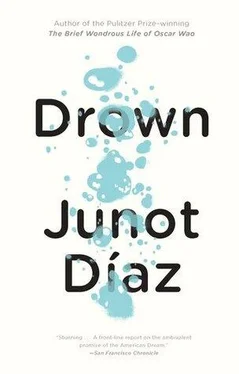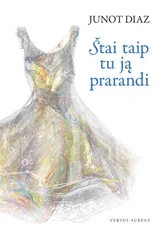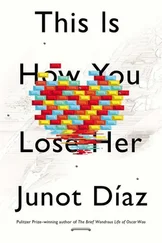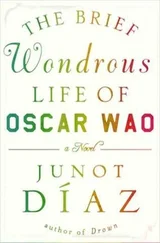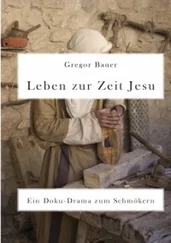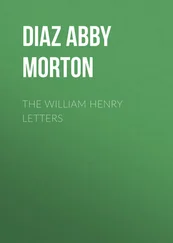What does the winner get?
A gold trophy, about this big.
OK, cabrón, I’m in. Don’t let go before me.
OK, he said, stepping to the other side of the gutter. We had a clear run down to the street corner. No cars were parked on our side, except for a drowned Monarch and there was plenty of room between its tires and the curb for us to navigate through.
We completed five runs before I noticed that somebody had parked their battered motorcycle in front of my house.
Who’s that? Wilfredo asked me, dropping his soggy boat into the water again.
I don’t know, I said.
Go find out.
I was already on my way. The motorcycle driver came out before I could reach our front door. He mounted quickly and was gone in a cloud of exhaust.
Mami and Abuelo were on the back patio, conver-sating. Abuelo was angry and his cane-cutter’s hands were clenched. I hadn’t seen Abuelo bravo in a long time, not since his produce truck had been stolen by two of his old employees.
Go outside, Mami told me.
Who was that?
Did I tell you something?
Was that somebody we know?
Outside, Mami said, her voice a murder about to happen.
What’s wrong? Wilfredo asked me when I rejoined him. His nose was starting to run.
I don’t know, I said.
When Rafa showed himself an hour later, swaggering in from a game of pool, I’d already tried to speak to Mami and Abuelo like five times. The last time, Mami had landed a slap on my neck and Wilfredo told me that he could see the imprints of her fingers on my skin. I told it all to Rafa.
That doesn’t sound good. He threw out his guttering cigarette. You wait here. He went around the back and I heard his voice and then Mami’s. No yelling, no argument.
Come on, he said. She wants us to wait in our room.
Why?
That’s what she said. You want me to tell her no?
Not while she’s mad.
Exactly.
I slapped Wilfredo’s hand and walked in the front door with Rafa. What’s going on?
She got a letter from Papi.
Really? Is there money?
No.
What does it say?
How should I know?
He sat down on his side of the bed and produced a pack of cigarettes. I watched him go through the elaborate ritual of lighting up — the flip of the thin cigarrillo into his lips and then the spark, a single practiced snap of the thumb.
Where’d you get that lighter?
Mi novia gave it to me.
Tell her to give me one.
Here. He tossed it to me. You can have it if you shut up.
Yeah?
See. He reached to take it. You already lost it.
I shut my mouth and he settled back down on the bed.
Hey, Sinbad, Wilfredo said, his head appearing in our window. What’s going on?
My father wrote us a letter!
Rafa rapped me on the side of my head. This is a family affair, Yunior. Don’t blab it all over the place.
Wilfredo smiled. I ain’t going to tell anybody.
Of course you’re not, Rafa said. Because if you do I’ll chop your fucking head off.
I tried to wait it out. Our room was nothing more than a section of the house that Abuelo had partitioned off with planks of wood. In one corner Mami kept an altar with candles and a cigar in a stone mortar and a glass of water and two toy soldiers we could not touch ever and above the bed hung our mosquito netting, poised to drop on us like a net. I lay back and listened to the rain brushing back and forth across our zinc roof.
Mami served dinner, watched as we ate it, and then ordered us back into our room. I’d never seen her so blank-faced, so stiff, and when I tried to hug her she pushed me away. Back to bed, she said. Back to listening to the rain. I must have fallen asleep because when I woke up Rafa was looking at me pensively and it was dark outside and nobody else in the house was awake.
I read the letter, he told me quietly. He was sitting cross-legged on the bed, his ribs laddering his chest in shadows. Papi says he’s coming.
Really?
Don’t believe it.
Why?
It ain’t the first time he’s made that promise, Yunior.
Oh, I said.
Outside Señora Tejada started singing to herself, badly.
Rafa?
Yeah?
I didn’t know you could read.
I was nine and couldn’t even write my own name.
Yeah, he said quietly. Something I picked up. Now go to bed.
4.
Rafa was right. It wasn’t the first time. Two years after he left, Papi wrote her saying he was coming for us and like an innocent Mami believed him. After being alone for two years she was ready to believe anything. She showed everybody his letter and even spoke to him on the phone. He wasn’t an easy man to reach but on this occasion she got through and he reassured her that yes, he was coming. His word was his bond. He even spoke to us, something that Rafa vaguely remembers, a lot of crap about how much he loved us and that we should take care of Mami.
She prepared a party, even lined up to have a goat there for the slaughtering. She bought me and Rafa new clothes and when he didn’t show she sent everybody home, sold the goat back to its owner and then almost lost her mind. I remember the heaviness of that month, thicker than almost anything. When Abuelo tried to reach our father at the phone numbers he’d left none of the men who’d lived with him knew anything about where he had gone.
It didn’t help matters that me and Rafa kept asking her when we were leaving for the States, when Papi was coming. I am told that I wanted to see his picture almost every day. It’s hard for me to imagine myself this way, crazy about Papi. When she refused to show me the photos I threw myself about like I was on fire. And I screamed. Even as a boy my voice carried farther than a man’s, turned heads on the street.
First Mami tried slapping me quiet but that did little. Then she locked me in my room where my brother told me to cool it but I shook my head and screamed louder. I was inconsolable. I learned to tear my clothes because this was the one thing I had whose destruction hurt my mother. She took all my shirts from my room, left me only with shorts which were hard to damage with bare fingers. I pulled a nail from our wall and punched a dozen holes in each pair, until Rafa cuffed me and said, Enough, you little puto.
Mami spent a lot of time out of the house, at work or down by the Malecón, where she could watch the waves shred themselves against the rocks, where men offered cigarettes that she smoked quietly. I don’t know how long this went on. Months, maybe three. Then, one morning in early spring, when the amapolas were flushed with their flame leaves, I woke up and found Abuelo alone in the house.
She’s gone, he said. So cry all you want, malcriado.
I learned later from Rafa that she was in Ocoa with our tíos.
Mami’s time away was never discussed, then or now. When she returned to us, five weeks later, she was thinner and darker and her hands were heavy with calluses. She looked younger, like the girl who had arrived in Santo Domingo fifteen years before, burning to be married. Her friends came and sat and talked and when Papi’s name was mentioned her eyes dimmed and when his name left, the darkness of her ojos returned and she would laugh, a small personal thunder that cleared the air.
She didn’t treat me badly on her return but we were no longer as close; she did not call me her Prieto or bring me chocolates from her work. That seemed to suit her fine. And I was young enough to grow out of her rejection. I still had baseball and my brother. I still had trees to climb and lizards to tear apart.
5.
The week after the letter came I watched her from my trees. She ironed cheese sandwiches in paper bags for our lunch, boiled platanos for our dinner. Our dirty clothes were pounded clean in the concrete trough on the side of the outhouse. Every time she thought I was scrabbling too high in the branches she called me back to the ground. You ain’t Spiderman, you know, she said, rapping the top of my head with her knuckles. On the afternoons that Wilfredo’s father came over to play dominos and talk politics, she sat with him and Abuelo and laughed at their campo stories. She seemed more normal to me but I was careful not to provoke her. There was still something volcanic about the way she held herself.
Читать дальше
